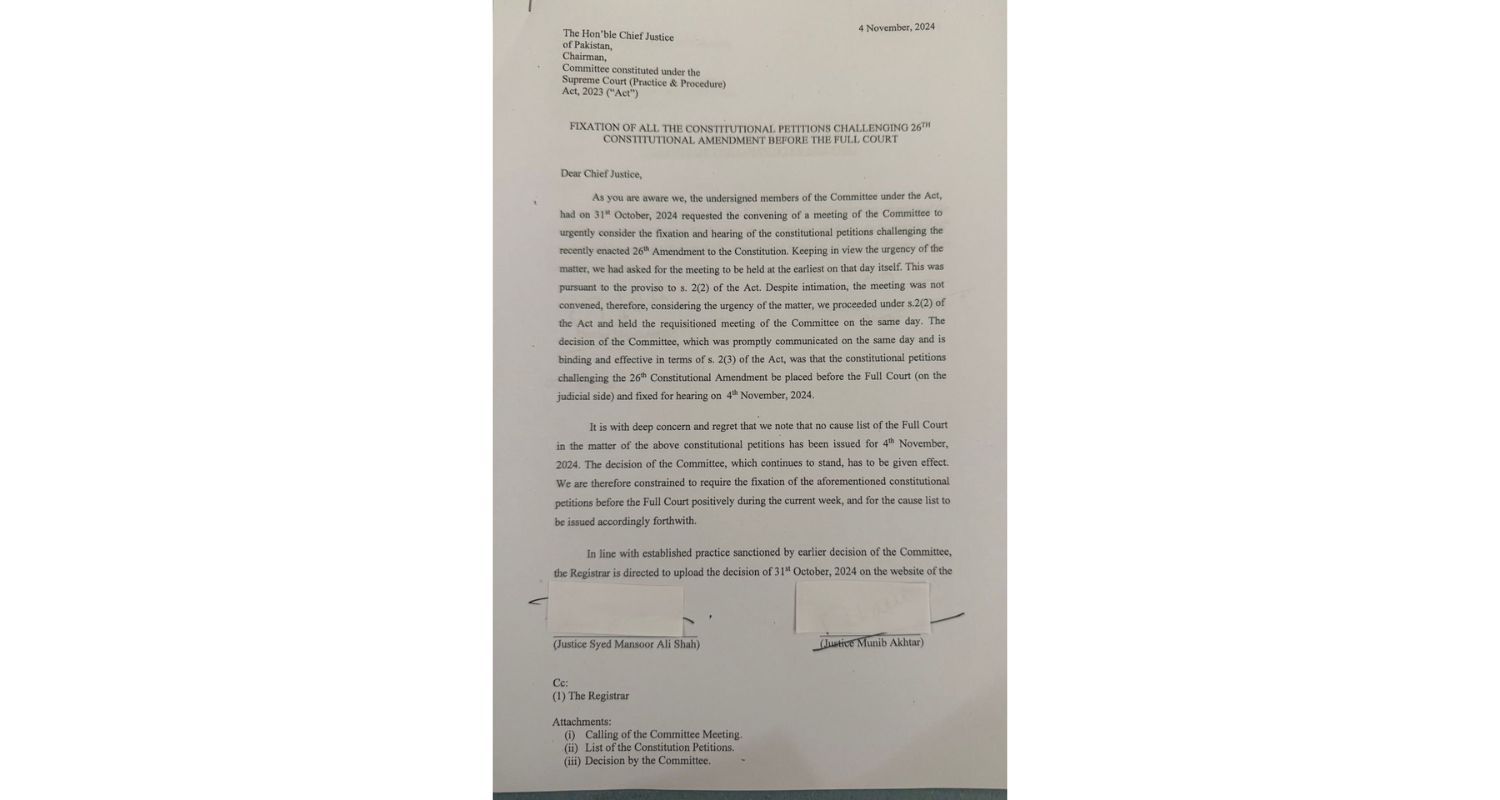In a recent development within Pakistan's judiciary, Supreme Court judges Justice Mansoor Ali Shah and Justice Munib Akhtar have pressed Chief Justice of Pakistan (CJP) Yahya Khan Afridi to expedite hearings on the pleas challenging the 26th Constitutional Amendment.
This call for urgency stems from concerns over judicial authority and public trust, as both judges argue that a prompt, full court review is essential to address the amendment's implications.
In a letter directed to Chief Justice Afridi, Justices Shah and Akhtar, who are members of the committee responsible for case scheduling under the Supreme Court Practice and Procedure Act of 2023, urged him to fix a date for hearing the amendment pleas.
According to their letter, the committee has agreed that a full court should hear these significant petitions, with an initial hearing date suggested for November 4. However, Chief Justice Afridi has not yet convened the full court, creating tensions and highlighting divisions within the judicial leadership.

The situation intensified on October 31, when Justices Shah and Akhtar first sent their formal letter to Chief Justice Afridi, advocating for an immediate meeting to address the petitions challenging the 26th amendment.
This amendment, involving adjustments to judicial authority and tenure, has sparked substantial debate within Pakistan’s legal community. By advocating for a full court session, Justices Shah and Akhtar signal the importance of addressing constitutional questions that they believe warrant an in-depth, collective review.
Without a direct response from the Chief Justice, the two judges met independently in Justice Akhtar’s chambers to discuss their next course of action. Following this meeting, the judges, by majority vote, opted to proceed by setting the petitions before a full court, scheduling a preliminary hearing for November 4. Despite this move, a formal cause list has yet to be issued, effectively delaying any official progress on the matter.
In response to the delay, Justices Shah and Akhtar have since sent a second letter to the Chief Justice, expressing their dissatisfaction with the lack of immediate action.
They referenced Section 2(2) of the Supreme Court Practice and Procedure Act, asserting that the law obligates the committee to address such cases without unnecessary delay. The letter emphasised that the registrar had been informed of their decision on October 31, requesting that the Supreme Court’s official website publish the decision to maintain transparency.
In their correspondence, Justices Shah and Akhtar underscored the urgency of the matter, stating that the case holds considerable importance for judicial integrity and public confidence in the legal system.
The judges argue that the petitions demand thorough examination by the full court, given the constitutional weight of the issues involved. They maintain that a full court session is crucial to ensuring that all perspectives within the judiciary are considered and that the legal process remains transparent to the public.
The Chief Justice’s reluctance to convene a full court, however, has brought to light a notable divide within the Supreme Court. Legal experts have noted that disagreements of this magnitude are rare within Pakistan’s judiciary, especially on matters that touch upon constitutional interpretation.
Some analysts suggest that Chief Justice Afridi’s decision to withhold a full court session may reflect a cautious approach, potentially aimed at preventing judicial overreach or avoiding the political sensitivities often linked to constitutional amendments.
The delay in addressing the 26th amendment petitions has continued to fuel debate within both legal circles and the broader public. Justices Shah and Akhtar have remained steadfast in their position, reiterating that a full court is necessary to uphold judicial transparency and ensure that the issue receives comprehensive scrutiny. For them, the amendment touches on fundamental judicial principles that demand careful and collective consideration.



